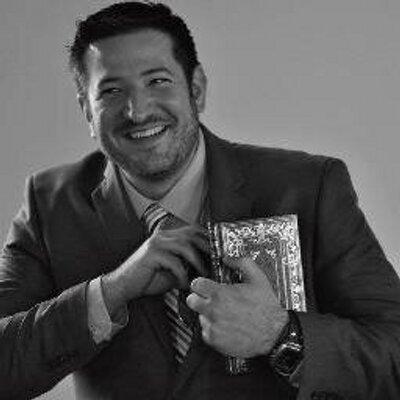Jared Wilson – I Am the Bread of Life
APRIL 10, 2014
Jared Wilson joined us this past weekend on stations across the country. His Steve Brown, Etc. program is now posted here at KeyLife.org. Join Steve and Jared for a dose of profundity and hilarity!
“I am the bread of life; whoever comes to me shall not hunger, and whoever believes in me shall never thirst” (John 6:35).
John 6 details a fascinating episode in the ministry of Jesus. It is a long chapter and a complex one, beginning with the miraculous feeding of the five thousand. As with all miracles, we are meant to see them as pointers to the signified, Christ himself and his kingdom. Like the parables, the miracles are windows into the life of the in-breaking kingdom of God. But many wanted Jesus to be their performing magician, like a trained miracle monkey or some such blasphemy. The Pharisees often sought signs from him in this way, as later did Herod (Luke 23:8). The average Joes of Jesus’s day were rather a mixed bag. It is difficult to know if even all the people he physically healed were born again. Certainly many were given faith and therefore had the eyes to see and the ears to hear Jesus as the Lamb of God who takes away the sins of the world. They received both the sign and the one signified. Others, however, seemed content to seek Jesus only for his benefits and not for himself. We see this very clearly in John 6, as Jesus moves from demonstrating to preaching:
“Truly, truly, I say to you, whoever believes has eternal life. I am the bread of life. Your fathers ate the manna in the wilder- ness, and they died. This is the bread that comes down from heaven, so that one may eat of it and not die. I am the living bread that came down from heaven. If anyone eats of this bread, he will live forever. And the bread that I will give for the life of the world is my flesh.”
The Jews then disputed among themselves, saying, “How can this man give us his flesh to eat?” So Jesus said to them, “Truly, truly, I say to you, unless you eat the flesh of the Son of Man and drink his blood, you have no life in you. Whoever feeds on my flesh and drinks my blood has eternal life, and I will raise him up on the last day” (John 6:47–54).
Even the disciples grumbled after Jesus said all that. There are several things Jesus is doing in this miracle and the discourse following. In the miracle, he is first demonstrating his presence as the provision of daily bread from the Father. He is also making the connection between the manna received by the children of Israel in the desert and this provision. But he goes further to say that he doesn’t just provide the manna; rather, he is the manna. In this way he is also raising the specter of antinomianism with many, because faithful Jews weren’t supposed to consume blood. The way Jesus constantly redirects his culture’s understanding of the old covenant Scriptures is an implicit assertion of his authority over not just the culture but their Scriptures! Indeed, when the crowd marvels that Jesus taught as one with authority (Matt. 7:28–29), they aren’t just seeing the kind of authority that results from years of study and theological training but the kind of authority that results from being the very author of what is being taught. Jesus’s audience was likely familiar with the words of Deuteronomy: “man does not live by bread alone, but man lives by every word that comes from the mouth of the Lord” (Deut. 8:3). We have read that Jesus is the Word of God (John 1:1). Putting one and one together, we get the dual meaning of God’s provision in his word and God’s provision of himself as the incarnate Word of God revealed in the written word of God. It is not bread alone that gives life but the bread of life.
And what fascinating bread! “I am the bread of life; whoever comes to me shall not hunger, and whoever believes in me shall never thirst” (John 6:35). Never thirst? How is it that bread might satisfy thirst? The bread of life is clearly all-satisfying.
Jesus has elsewhere referenced his supply of living water (John 4:10), an explicit connection of himself with the promises of Jeremiah 17:13 and Zechariah 14:8. But there is no such explicit connection here. Perhaps it is implied. Or else, Jesus is stating just how sufficient the nourishment of his flesh actually is. In context, he widens his command to include both eating his flesh and drinking his blood. There are certainly foreshadowings of the Eucharist here, but at this point Jesus has yet to institute the Lord’s Supper, and, furthermore, it seems better to say the Eucharist corresponds to John 6 rather than that John 6 corresponds to the Eucharist. Calvin appeals to the Hebrew custom of using the word “bread,” as in daily bread, as a figure of speech to mean more generally “dinner” or “supper.” If this is the case, the kind of bread Jesus says he is has a multiplicity of effects. To come to him in hunger is to be satisfied not just in hunger but also in thirst. The supreme and preeminent Lord of All is in fact the bread that is an everlasting meal, an eternal feast for the soul.
And while Genesis 3:19 prescribes bread procured through the sweat of the brow, the gospel promises bread given freely through the bloody brow of the Son.
The image used with this post is licensed under
the Creative Commons Attribution-Share Alike 3.0 Unported license.
Attribution: Joe Mabel

 Search
Search

